IT Ethics Essay: Analysis of Researcher Sharing Science Papers Freely
VerifiedAdded on 2020/05/28
|10
|2217
|91
Essay
AI Summary
This essay delves into the ethical complexities surrounding a researcher's decision to illegally share millions of scientific papers online through the Sci-Hub website. The assignment, conducted by a student, examines the actions of Alexandra Elbakyan, a Russian researcher and neuroscientist, who made peer-reviewed articles and journal papers available for free, challenging the traditional subscription-based model of academic publishing. The essay employs four key ethical theories—Utilitarianism, Deontology, Virtue Ethics, and Contract Theory—to analyze the morality of Elbakyan's actions. Utilitarianism supports her actions as maximizing happiness by spreading knowledge. Deontology considers the act of piracy as unethical. Virtue Ethics views her intentions as virtuous. Contract Theory finds the action unethical due to violation of societal norms. The essay concludes that the ethical implications of sharing the papers are multifaceted, depending on the ethical framework used, highlighting the tension between intellectual property rights and the free dissemination of knowledge. The essay also includes a 'Doing Ethics' section, which provides a structured approach to analyzing the case. The essay uses references to support its arguments.
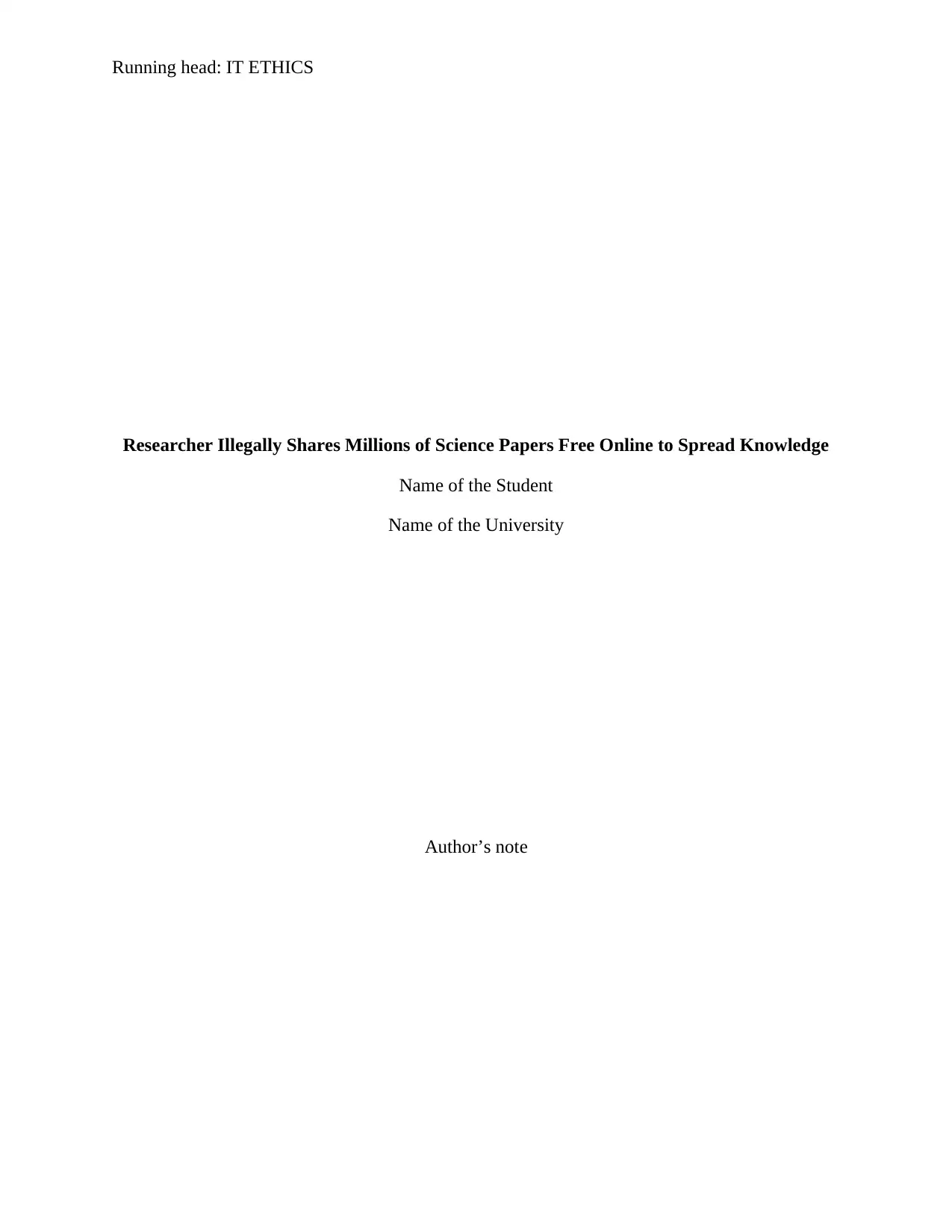
Running head: IT ETHICS
Researcher Illegally Shares Millions of Science Papers Free Online to Spread Knowledge
Name of the Student
Name of the University
Author’s note
Researcher Illegally Shares Millions of Science Papers Free Online to Spread Knowledge
Name of the Student
Name of the University
Author’s note
Paraphrase This Document
Need a fresh take? Get an instant paraphrase of this document with our AI Paraphraser

1
IT ETHICS
“Researcher Illegally Shares Millions of Science Papers Free Online to
Spread Knowledge”
Ethics is a field that deals with moral principles and philosophy. It helps in
recommending and defending the concepts of wrong or right behaviour (Peters, 2015). Ethical
theories can be used for understanding whether an action is morally correct or incorrect. Ethical
theories are classified into metaethics, applied ethics and normative ethics (Melden, 2013).
Metaethics tries to get an insight into the meaning of the principles of ethics and revolves around
the concept of moral judgements. Applied ethics focuses on examining controversial situations
and issues such as animal rights and nuclear war. Normative ethics tries to establish moral
standards for regulating right as well as wrong conduct (Dewey, 2016). This essay uses the four
main ethical theories: Utilitarianism, Virtue Ethics, Deontology and Contract Theory for
analysing an article based on automation. It explains the concepts of the four ethical theories and
tries to find out whether automation is ethically right or wrong.
About the article
A researcher and neuroscientist from Russia named Alexandra Elbakyan made 48 million
or more peer reviews and journal articles available over the Internet at free of cost. She was
accused of providing pirated journals via a site called Sci-Hub in an illegal manner. She had
refused to close the Sci-Hub despite a lawsuit from one of the biggest publishers in the world,
Elsevier. A district court New York had also ordered to close the site. According to Elbakyan,
paying $32 was expensive for the students for carrying out research work (MacDonald, 2018).
She believed that knowledge should be accessible to everyone irrespective of their income. She
even claimed that leading universities such as Cornell and Harvard were unable to afford the
IT ETHICS
“Researcher Illegally Shares Millions of Science Papers Free Online to
Spread Knowledge”
Ethics is a field that deals with moral principles and philosophy. It helps in
recommending and defending the concepts of wrong or right behaviour (Peters, 2015). Ethical
theories can be used for understanding whether an action is morally correct or incorrect. Ethical
theories are classified into metaethics, applied ethics and normative ethics (Melden, 2013).
Metaethics tries to get an insight into the meaning of the principles of ethics and revolves around
the concept of moral judgements. Applied ethics focuses on examining controversial situations
and issues such as animal rights and nuclear war. Normative ethics tries to establish moral
standards for regulating right as well as wrong conduct (Dewey, 2016). This essay uses the four
main ethical theories: Utilitarianism, Virtue Ethics, Deontology and Contract Theory for
analysing an article based on automation. It explains the concepts of the four ethical theories and
tries to find out whether automation is ethically right or wrong.
About the article
A researcher and neuroscientist from Russia named Alexandra Elbakyan made 48 million
or more peer reviews and journal articles available over the Internet at free of cost. She was
accused of providing pirated journals via a site called Sci-Hub in an illegal manner. She had
refused to close the Sci-Hub despite a lawsuit from one of the biggest publishers in the world,
Elsevier. A district court New York had also ordered to close the site. According to Elbakyan,
paying $32 was expensive for the students for carrying out research work (MacDonald, 2018).
She believed that knowledge should be accessible to everyone irrespective of their income. She
even claimed that leading universities such as Cornell and Harvard were unable to afford the
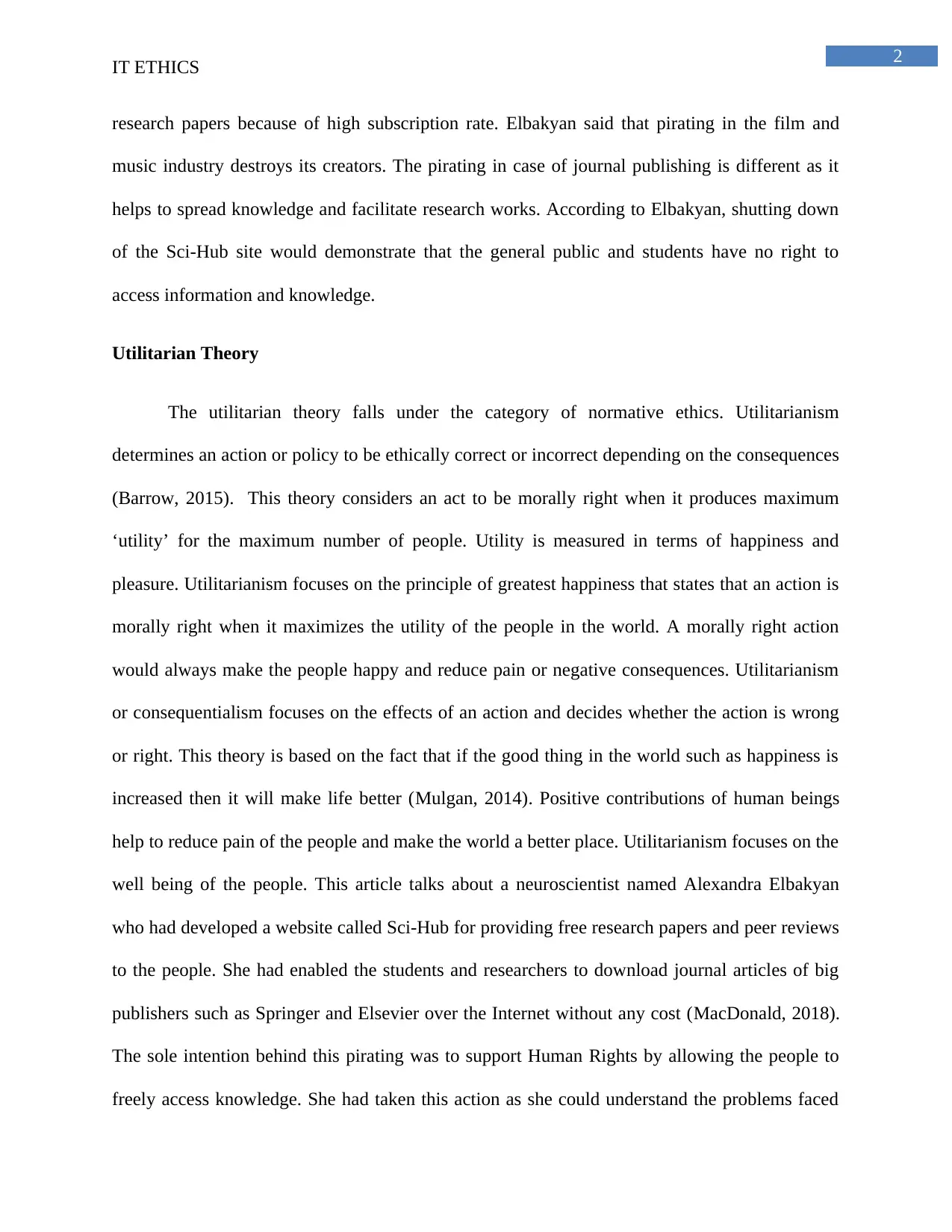
2
IT ETHICS
research papers because of high subscription rate. Elbakyan said that pirating in the film and
music industry destroys its creators. The pirating in case of journal publishing is different as it
helps to spread knowledge and facilitate research works. According to Elbakyan, shutting down
of the Sci-Hub site would demonstrate that the general public and students have no right to
access information and knowledge.
Utilitarian Theory
The utilitarian theory falls under the category of normative ethics. Utilitarianism
determines an action or policy to be ethically correct or incorrect depending on the consequences
(Barrow, 2015). This theory considers an act to be morally right when it produces maximum
‘utility’ for the maximum number of people. Utility is measured in terms of happiness and
pleasure. Utilitarianism focuses on the principle of greatest happiness that states that an action is
morally right when it maximizes the utility of the people in the world. A morally right action
would always make the people happy and reduce pain or negative consequences. Utilitarianism
or consequentialism focuses on the effects of an action and decides whether the action is wrong
or right. This theory is based on the fact that if the good thing in the world such as happiness is
increased then it will make life better (Mulgan, 2014). Positive contributions of human beings
help to reduce pain of the people and make the world a better place. Utilitarianism focuses on the
well being of the people. This article talks about a neuroscientist named Alexandra Elbakyan
who had developed a website called Sci-Hub for providing free research papers and peer reviews
to the people. She had enabled the students and researchers to download journal articles of big
publishers such as Springer and Elsevier over the Internet without any cost (MacDonald, 2018).
The sole intention behind this pirating was to support Human Rights by allowing the people to
freely access knowledge. She had taken this action as she could understand the problems faced
IT ETHICS
research papers because of high subscription rate. Elbakyan said that pirating in the film and
music industry destroys its creators. The pirating in case of journal publishing is different as it
helps to spread knowledge and facilitate research works. According to Elbakyan, shutting down
of the Sci-Hub site would demonstrate that the general public and students have no right to
access information and knowledge.
Utilitarian Theory
The utilitarian theory falls under the category of normative ethics. Utilitarianism
determines an action or policy to be ethically correct or incorrect depending on the consequences
(Barrow, 2015). This theory considers an act to be morally right when it produces maximum
‘utility’ for the maximum number of people. Utility is measured in terms of happiness and
pleasure. Utilitarianism focuses on the principle of greatest happiness that states that an action is
morally right when it maximizes the utility of the people in the world. A morally right action
would always make the people happy and reduce pain or negative consequences. Utilitarianism
or consequentialism focuses on the effects of an action and decides whether the action is wrong
or right. This theory is based on the fact that if the good thing in the world such as happiness is
increased then it will make life better (Mulgan, 2014). Positive contributions of human beings
help to reduce pain of the people and make the world a better place. Utilitarianism focuses on the
well being of the people. This article talks about a neuroscientist named Alexandra Elbakyan
who had developed a website called Sci-Hub for providing free research papers and peer reviews
to the people. She had enabled the students and researchers to download journal articles of big
publishers such as Springer and Elsevier over the Internet without any cost (MacDonald, 2018).
The sole intention behind this pirating was to support Human Rights by allowing the people to
freely access knowledge. She had taken this action as she could understand the problems faced
⊘ This is a preview!⊘
Do you want full access?
Subscribe today to unlock all pages.

Trusted by 1+ million students worldwide
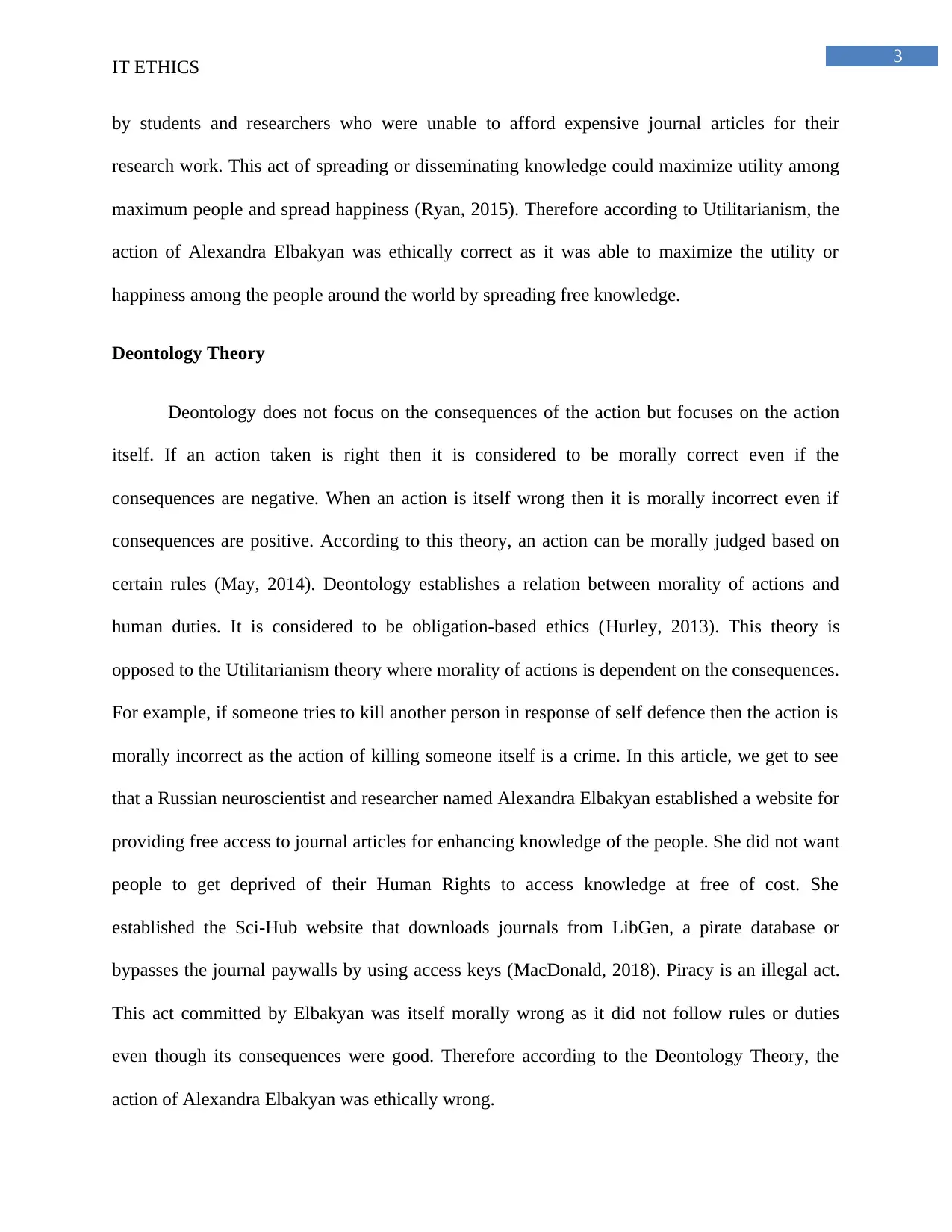
3
IT ETHICS
by students and researchers who were unable to afford expensive journal articles for their
research work. This act of spreading or disseminating knowledge could maximize utility among
maximum people and spread happiness (Ryan, 2015). Therefore according to Utilitarianism, the
action of Alexandra Elbakyan was ethically correct as it was able to maximize the utility or
happiness among the people around the world by spreading free knowledge.
Deontology Theory
Deontology does not focus on the consequences of the action but focuses on the action
itself. If an action taken is right then it is considered to be morally correct even if the
consequences are negative. When an action is itself wrong then it is morally incorrect even if
consequences are positive. According to this theory, an action can be morally judged based on
certain rules (May, 2014). Deontology establishes a relation between morality of actions and
human duties. It is considered to be obligation-based ethics (Hurley, 2013). This theory is
opposed to the Utilitarianism theory where morality of actions is dependent on the consequences.
For example, if someone tries to kill another person in response of self defence then the action is
morally incorrect as the action of killing someone itself is a crime. In this article, we get to see
that a Russian neuroscientist and researcher named Alexandra Elbakyan established a website for
providing free access to journal articles for enhancing knowledge of the people. She did not want
people to get deprived of their Human Rights to access knowledge at free of cost. She
established the Sci-Hub website that downloads journals from LibGen, a pirate database or
bypasses the journal paywalls by using access keys (MacDonald, 2018). Piracy is an illegal act.
This act committed by Elbakyan was itself morally wrong as it did not follow rules or duties
even though its consequences were good. Therefore according to the Deontology Theory, the
action of Alexandra Elbakyan was ethically wrong.
IT ETHICS
by students and researchers who were unable to afford expensive journal articles for their
research work. This act of spreading or disseminating knowledge could maximize utility among
maximum people and spread happiness (Ryan, 2015). Therefore according to Utilitarianism, the
action of Alexandra Elbakyan was ethically correct as it was able to maximize the utility or
happiness among the people around the world by spreading free knowledge.
Deontology Theory
Deontology does not focus on the consequences of the action but focuses on the action
itself. If an action taken is right then it is considered to be morally correct even if the
consequences are negative. When an action is itself wrong then it is morally incorrect even if
consequences are positive. According to this theory, an action can be morally judged based on
certain rules (May, 2014). Deontology establishes a relation between morality of actions and
human duties. It is considered to be obligation-based ethics (Hurley, 2013). This theory is
opposed to the Utilitarianism theory where morality of actions is dependent on the consequences.
For example, if someone tries to kill another person in response of self defence then the action is
morally incorrect as the action of killing someone itself is a crime. In this article, we get to see
that a Russian neuroscientist and researcher named Alexandra Elbakyan established a website for
providing free access to journal articles for enhancing knowledge of the people. She did not want
people to get deprived of their Human Rights to access knowledge at free of cost. She
established the Sci-Hub website that downloads journals from LibGen, a pirate database or
bypasses the journal paywalls by using access keys (MacDonald, 2018). Piracy is an illegal act.
This act committed by Elbakyan was itself morally wrong as it did not follow rules or duties
even though its consequences were good. Therefore according to the Deontology Theory, the
action of Alexandra Elbakyan was ethically wrong.
Paraphrase This Document
Need a fresh take? Get an instant paraphrase of this document with our AI Paraphraser
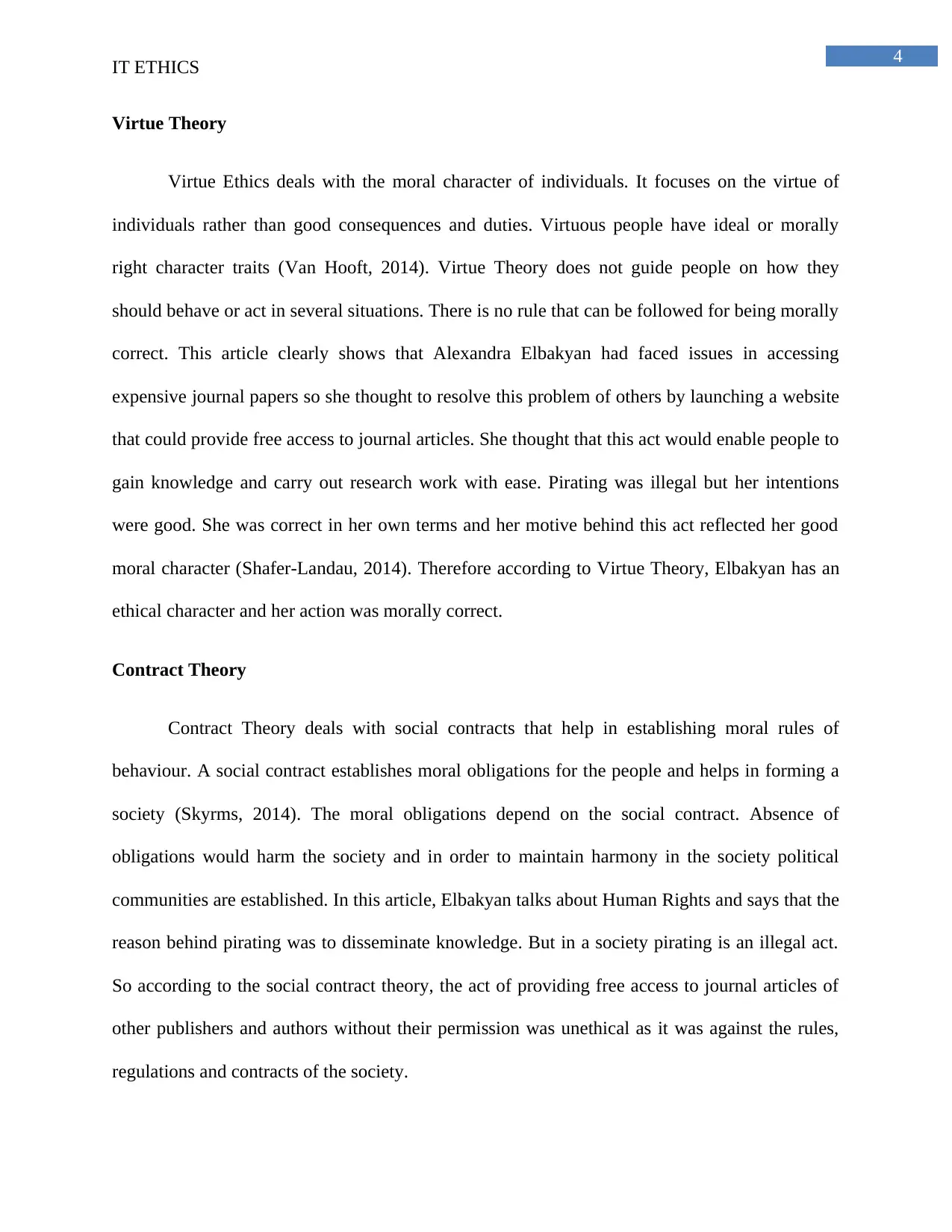
4
IT ETHICS
Virtue Theory
Virtue Ethics deals with the moral character of individuals. It focuses on the virtue of
individuals rather than good consequences and duties. Virtuous people have ideal or morally
right character traits (Van Hooft, 2014). Virtue Theory does not guide people on how they
should behave or act in several situations. There is no rule that can be followed for being morally
correct. This article clearly shows that Alexandra Elbakyan had faced issues in accessing
expensive journal papers so she thought to resolve this problem of others by launching a website
that could provide free access to journal articles. She thought that this act would enable people to
gain knowledge and carry out research work with ease. Pirating was illegal but her intentions
were good. She was correct in her own terms and her motive behind this act reflected her good
moral character (Shafer-Landau, 2014). Therefore according to Virtue Theory, Elbakyan has an
ethical character and her action was morally correct.
Contract Theory
Contract Theory deals with social contracts that help in establishing moral rules of
behaviour. A social contract establishes moral obligations for the people and helps in forming a
society (Skyrms, 2014). The moral obligations depend on the social contract. Absence of
obligations would harm the society and in order to maintain harmony in the society political
communities are established. In this article, Elbakyan talks about Human Rights and says that the
reason behind pirating was to disseminate knowledge. But in a society pirating is an illegal act.
So according to the social contract theory, the act of providing free access to journal articles of
other publishers and authors without their permission was unethical as it was against the rules,
regulations and contracts of the society.
IT ETHICS
Virtue Theory
Virtue Ethics deals with the moral character of individuals. It focuses on the virtue of
individuals rather than good consequences and duties. Virtuous people have ideal or morally
right character traits (Van Hooft, 2014). Virtue Theory does not guide people on how they
should behave or act in several situations. There is no rule that can be followed for being morally
correct. This article clearly shows that Alexandra Elbakyan had faced issues in accessing
expensive journal papers so she thought to resolve this problem of others by launching a website
that could provide free access to journal articles. She thought that this act would enable people to
gain knowledge and carry out research work with ease. Pirating was illegal but her intentions
were good. She was correct in her own terms and her motive behind this act reflected her good
moral character (Shafer-Landau, 2014). Therefore according to Virtue Theory, Elbakyan has an
ethical character and her action was morally correct.
Contract Theory
Contract Theory deals with social contracts that help in establishing moral rules of
behaviour. A social contract establishes moral obligations for the people and helps in forming a
society (Skyrms, 2014). The moral obligations depend on the social contract. Absence of
obligations would harm the society and in order to maintain harmony in the society political
communities are established. In this article, Elbakyan talks about Human Rights and says that the
reason behind pirating was to disseminate knowledge. But in a society pirating is an illegal act.
So according to the social contract theory, the act of providing free access to journal articles of
other publishers and authors without their permission was unethical as it was against the rules,
regulations and contracts of the society.
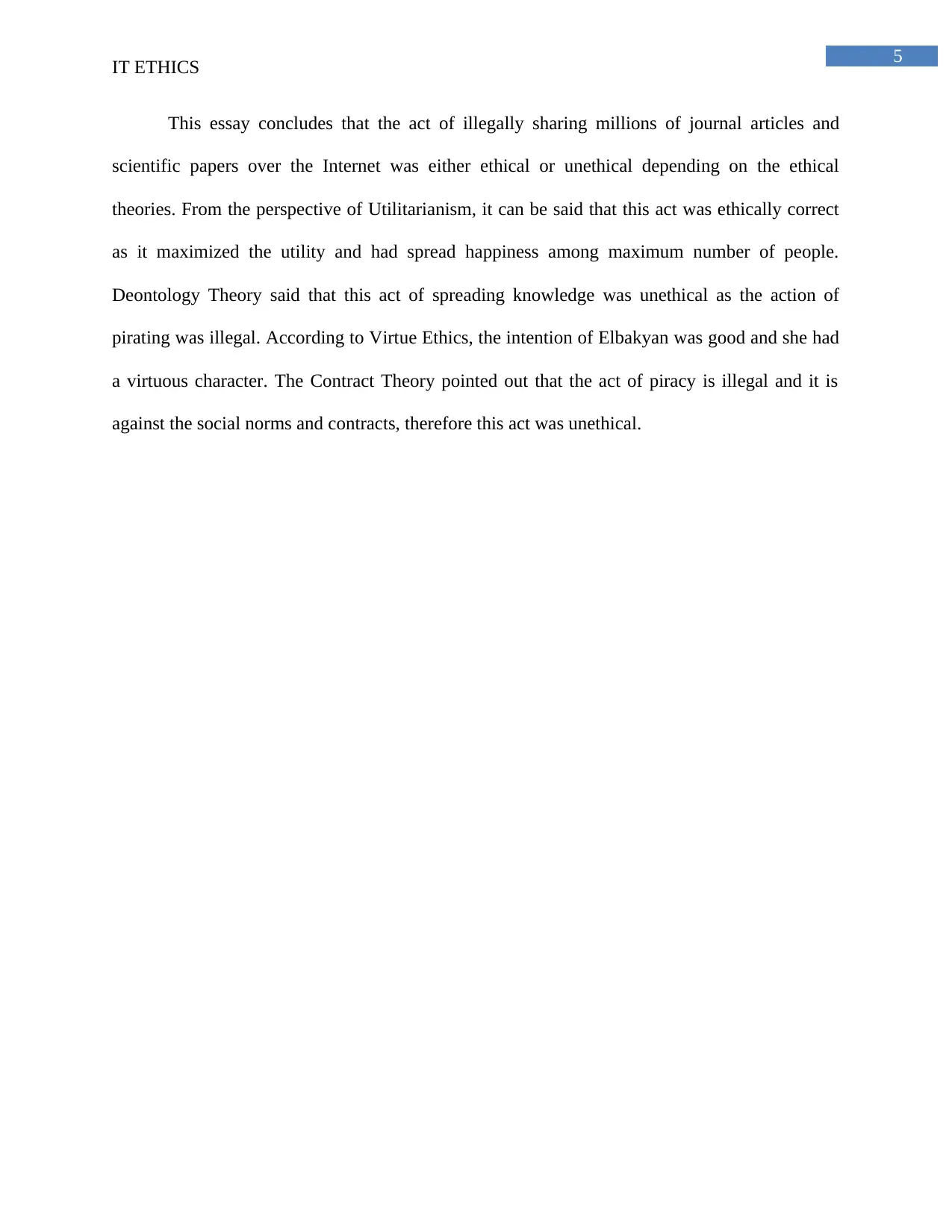
5
IT ETHICS
This essay concludes that the act of illegally sharing millions of journal articles and
scientific papers over the Internet was either ethical or unethical depending on the ethical
theories. From the perspective of Utilitarianism, it can be said that this act was ethically correct
as it maximized the utility and had spread happiness among maximum number of people.
Deontology Theory said that this act of spreading knowledge was unethical as the action of
pirating was illegal. According to Virtue Ethics, the intention of Elbakyan was good and she had
a virtuous character. The Contract Theory pointed out that the act of piracy is illegal and it is
against the social norms and contracts, therefore this act was unethical.
IT ETHICS
This essay concludes that the act of illegally sharing millions of journal articles and
scientific papers over the Internet was either ethical or unethical depending on the ethical
theories. From the perspective of Utilitarianism, it can be said that this act was ethically correct
as it maximized the utility and had spread happiness among maximum number of people.
Deontology Theory said that this act of spreading knowledge was unethical as the action of
pirating was illegal. According to Virtue Ethics, the intention of Elbakyan was good and she had
a virtuous character. The Contract Theory pointed out that the act of piracy is illegal and it is
against the social norms and contracts, therefore this act was unethical.
⊘ This is a preview!⊘
Do you want full access?
Subscribe today to unlock all pages.

Trusted by 1+ million students worldwide
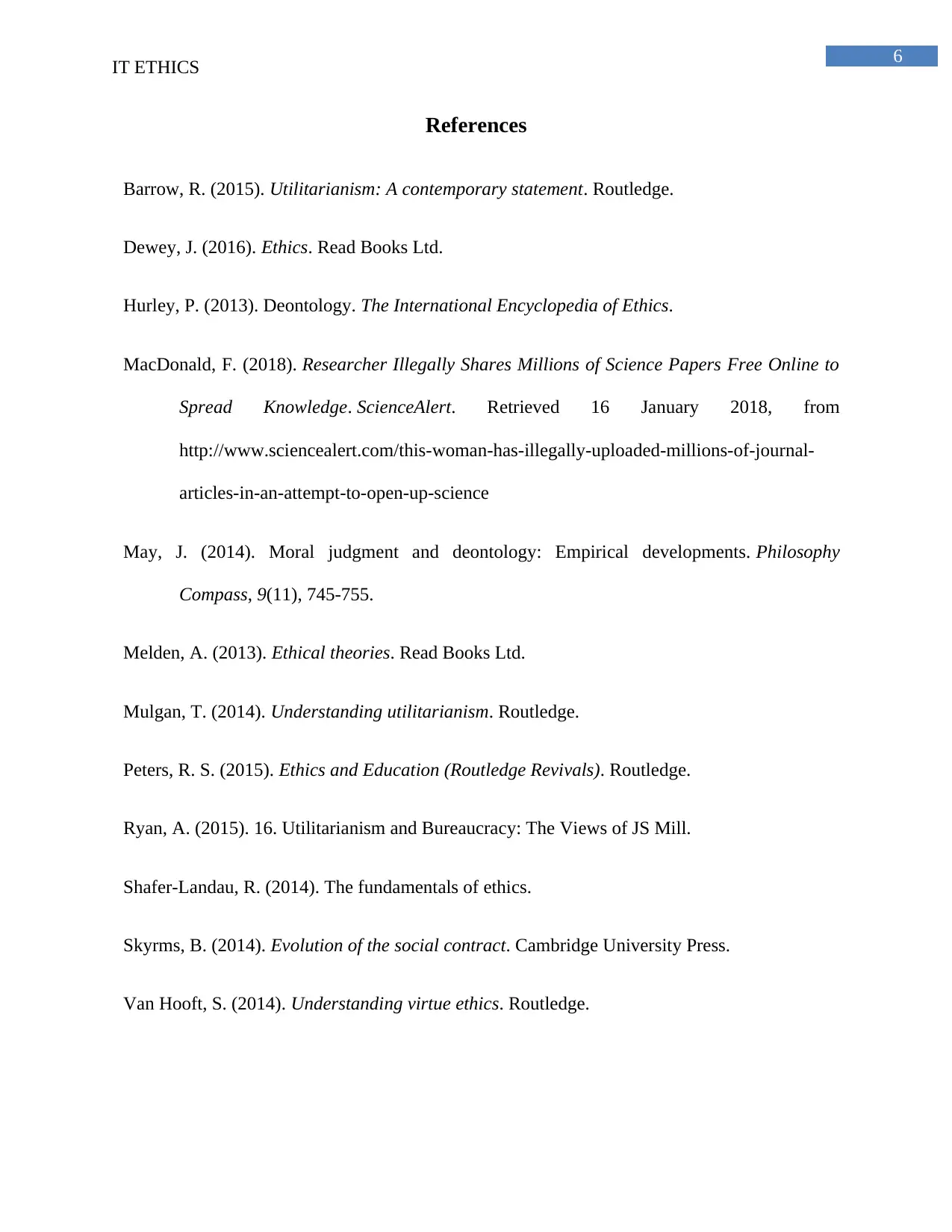
6
IT ETHICS
References
Barrow, R. (2015). Utilitarianism: A contemporary statement. Routledge.
Dewey, J. (2016). Ethics. Read Books Ltd.
Hurley, P. (2013). Deontology. The International Encyclopedia of Ethics.
MacDonald, F. (2018). Researcher Illegally Shares Millions of Science Papers Free Online to
Spread Knowledge. ScienceAlert. Retrieved 16 January 2018, from
http://www.sciencealert.com/this-woman-has-illegally-uploaded-millions-of-journal-
articles-in-an-attempt-to-open-up-science
May, J. (2014). Moral judgment and deontology: Empirical developments. Philosophy
Compass, 9(11), 745-755.
Melden, A. (2013). Ethical theories. Read Books Ltd.
Mulgan, T. (2014). Understanding utilitarianism. Routledge.
Peters, R. S. (2015). Ethics and Education (Routledge Revivals). Routledge.
Ryan, A. (2015). 16. Utilitarianism and Bureaucracy: The Views of JS Mill.
Shafer-Landau, R. (2014). The fundamentals of ethics.
Skyrms, B. (2014). Evolution of the social contract. Cambridge University Press.
Van Hooft, S. (2014). Understanding virtue ethics. Routledge.
IT ETHICS
References
Barrow, R. (2015). Utilitarianism: A contemporary statement. Routledge.
Dewey, J. (2016). Ethics. Read Books Ltd.
Hurley, P. (2013). Deontology. The International Encyclopedia of Ethics.
MacDonald, F. (2018). Researcher Illegally Shares Millions of Science Papers Free Online to
Spread Knowledge. ScienceAlert. Retrieved 16 January 2018, from
http://www.sciencealert.com/this-woman-has-illegally-uploaded-millions-of-journal-
articles-in-an-attempt-to-open-up-science
May, J. (2014). Moral judgment and deontology: Empirical developments. Philosophy
Compass, 9(11), 745-755.
Melden, A. (2013). Ethical theories. Read Books Ltd.
Mulgan, T. (2014). Understanding utilitarianism. Routledge.
Peters, R. S. (2015). Ethics and Education (Routledge Revivals). Routledge.
Ryan, A. (2015). 16. Utilitarianism and Bureaucracy: The Views of JS Mill.
Shafer-Landau, R. (2014). The fundamentals of ethics.
Skyrms, B. (2014). Evolution of the social contract. Cambridge University Press.
Van Hooft, S. (2014). Understanding virtue ethics. Routledge.
Paraphrase This Document
Need a fresh take? Get an instant paraphrase of this document with our AI Paraphraser
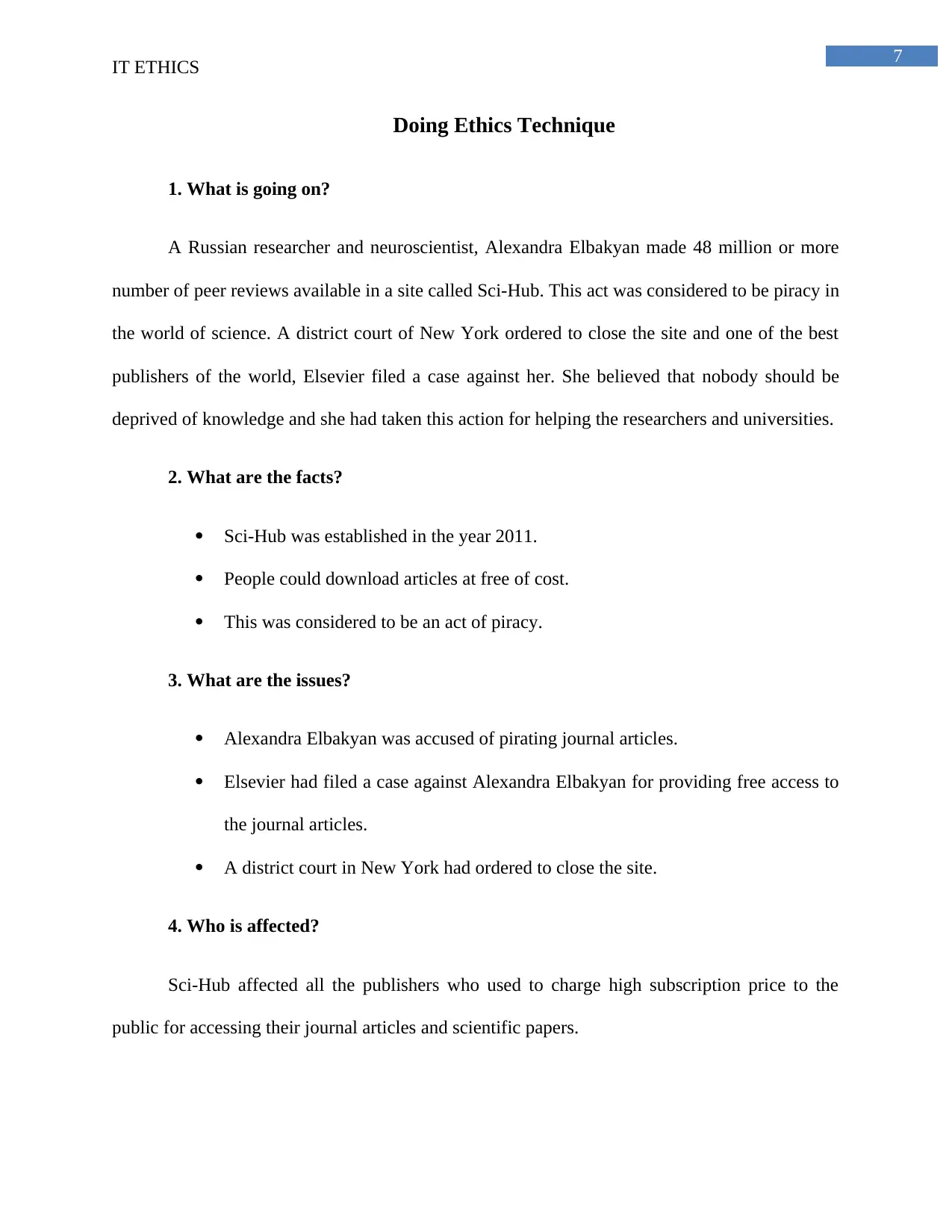
7
IT ETHICS
Doing Ethics Technique
1. What is going on?
A Russian researcher and neuroscientist, Alexandra Elbakyan made 48 million or more
number of peer reviews available in a site called Sci-Hub. This act was considered to be piracy in
the world of science. A district court of New York ordered to close the site and one of the best
publishers of the world, Elsevier filed a case against her. She believed that nobody should be
deprived of knowledge and she had taken this action for helping the researchers and universities.
2. What are the facts?
Sci-Hub was established in the year 2011.
People could download articles at free of cost.
This was considered to be an act of piracy.
3. What are the issues?
Alexandra Elbakyan was accused of pirating journal articles.
Elsevier had filed a case against Alexandra Elbakyan for providing free access to
the journal articles.
A district court in New York had ordered to close the site.
4. Who is affected?
Sci-Hub affected all the publishers who used to charge high subscription price to the
public for accessing their journal articles and scientific papers.
IT ETHICS
Doing Ethics Technique
1. What is going on?
A Russian researcher and neuroscientist, Alexandra Elbakyan made 48 million or more
number of peer reviews available in a site called Sci-Hub. This act was considered to be piracy in
the world of science. A district court of New York ordered to close the site and one of the best
publishers of the world, Elsevier filed a case against her. She believed that nobody should be
deprived of knowledge and she had taken this action for helping the researchers and universities.
2. What are the facts?
Sci-Hub was established in the year 2011.
People could download articles at free of cost.
This was considered to be an act of piracy.
3. What are the issues?
Alexandra Elbakyan was accused of pirating journal articles.
Elsevier had filed a case against Alexandra Elbakyan for providing free access to
the journal articles.
A district court in New York had ordered to close the site.
4. Who is affected?
Sci-Hub affected all the publishers who used to charge high subscription price to the
public for accessing their journal articles and scientific papers.
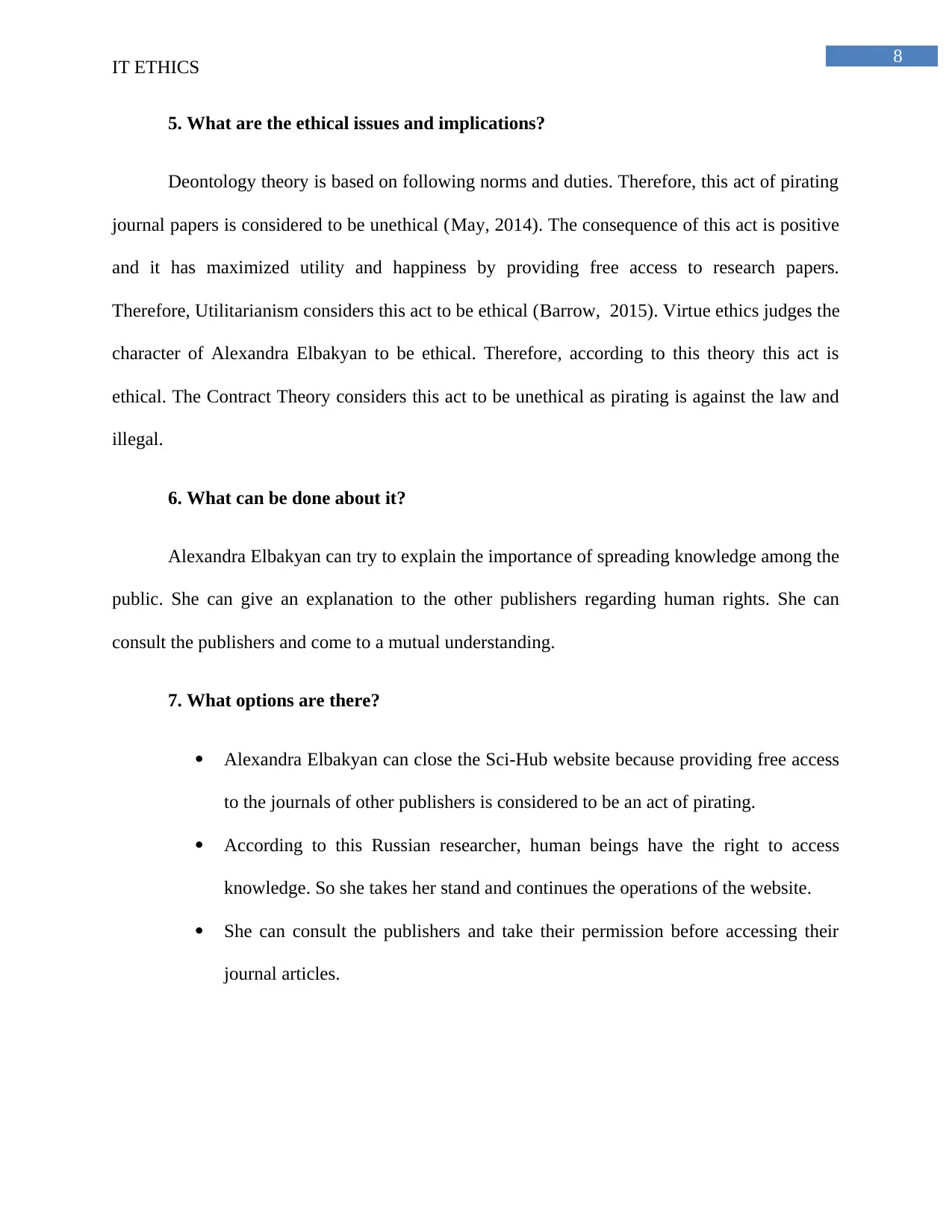
8
IT ETHICS
5. What are the ethical issues and implications?
Deontology theory is based on following norms and duties. Therefore, this act of pirating
journal papers is considered to be unethical (May, 2014). The consequence of this act is positive
and it has maximized utility and happiness by providing free access to research papers.
Therefore, Utilitarianism considers this act to be ethical (Barrow, 2015). Virtue ethics judges the
character of Alexandra Elbakyan to be ethical. Therefore, according to this theory this act is
ethical. The Contract Theory considers this act to be unethical as pirating is against the law and
illegal.
6. What can be done about it?
Alexandra Elbakyan can try to explain the importance of spreading knowledge among the
public. She can give an explanation to the other publishers regarding human rights. She can
consult the publishers and come to a mutual understanding.
7. What options are there?
Alexandra Elbakyan can close the Sci-Hub website because providing free access
to the journals of other publishers is considered to be an act of pirating.
According to this Russian researcher, human beings have the right to access
knowledge. So she takes her stand and continues the operations of the website.
She can consult the publishers and take their permission before accessing their
journal articles.
IT ETHICS
5. What are the ethical issues and implications?
Deontology theory is based on following norms and duties. Therefore, this act of pirating
journal papers is considered to be unethical (May, 2014). The consequence of this act is positive
and it has maximized utility and happiness by providing free access to research papers.
Therefore, Utilitarianism considers this act to be ethical (Barrow, 2015). Virtue ethics judges the
character of Alexandra Elbakyan to be ethical. Therefore, according to this theory this act is
ethical. The Contract Theory considers this act to be unethical as pirating is against the law and
illegal.
6. What can be done about it?
Alexandra Elbakyan can try to explain the importance of spreading knowledge among the
public. She can give an explanation to the other publishers regarding human rights. She can
consult the publishers and come to a mutual understanding.
7. What options are there?
Alexandra Elbakyan can close the Sci-Hub website because providing free access
to the journals of other publishers is considered to be an act of pirating.
According to this Russian researcher, human beings have the right to access
knowledge. So she takes her stand and continues the operations of the website.
She can consult the publishers and take their permission before accessing their
journal articles.
⊘ This is a preview!⊘
Do you want full access?
Subscribe today to unlock all pages.

Trusted by 1+ million students worldwide

9
IT ETHICS
8. Which option is best and why?
The best option is to consult the publishers and explain them human rights before
accessing their journals. This will resolve the issue of piracy and also will spread knowledge to
the public without charging any cost.
IT ETHICS
8. Which option is best and why?
The best option is to consult the publishers and explain them human rights before
accessing their journals. This will resolve the issue of piracy and also will spread knowledge to
the public without charging any cost.
1 out of 10
Related Documents
Your All-in-One AI-Powered Toolkit for Academic Success.
+13062052269
info@desklib.com
Available 24*7 on WhatsApp / Email
![[object Object]](/_next/static/media/star-bottom.7253800d.svg)
Unlock your academic potential
Copyright © 2020–2026 A2Z Services. All Rights Reserved. Developed and managed by ZUCOL.





